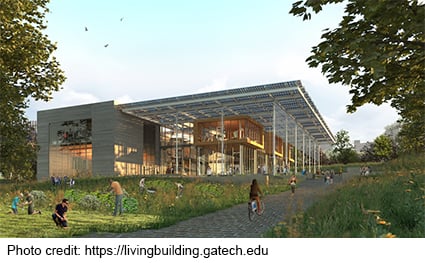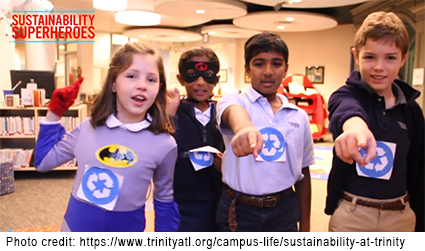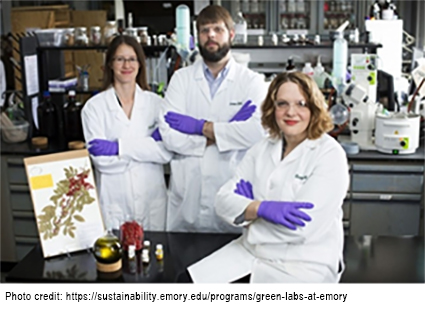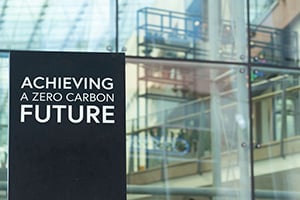By Truc Vu
Engineering Analyst
Sustainable Investment Group (SIG)
From elementary schools to Universities, schools are leading the way for a new generation of sustainable-minded individuals. Here’s a look at what Georgia schools and colleges are doing!
Living Building Challenge at Georgia Tech
 The Living Building Challenge is one of the world’s most rigorous building certification programs designed with a framework that captures more energy than it consumes. The seven performance categories are divided by “Petals”: Place, Water, Energy, Health & Happiness, Materials, Equity and Beauty. In 2016, Georgia Tech received a 30-million-dollar grant from The Kendeda Fund to build one of the most environmental education and research buildings in the Southeast.
The Living Building Challenge is one of the world’s most rigorous building certification programs designed with a framework that captures more energy than it consumes. The seven performance categories are divided by “Petals”: Place, Water, Energy, Health & Happiness, Materials, Equity and Beauty. In 2016, Georgia Tech received a 30-million-dollar grant from The Kendeda Fund to build one of the most environmental education and research buildings in the Southeast.
Set to open in Spring 2020, some of the key building features include:
- Photovoltaic Canopy
- With a targeted Energy Usage Intensity (EUI) of 34 (66% more efficient than a building of the same size), the solar array capacity plans to produce approximately 367,000 kWh of energy.
- Rainwater and Greywater Treatment
- Rooftop rainwater catchment will be filtered and disinfected to supply potable water (safe to drink)
- Greywater (waste water from sinks and toilets) treatment system will supply irrigation water
- Composting toilets will produce compost and fertilizer
Sustainability at Trinity Elementary School
 Trinity School, an elementary private school in Atlanta, is shaping education on sustainability in elementary education. Their sustainability plans incorporate students, parents, teachers, and administration.
Trinity School, an elementary private school in Atlanta, is shaping education on sustainability in elementary education. Their sustainability plans incorporate students, parents, teachers, and administration.
Their sustainability plans include:
- Encouraging parents to turn off their car engines during morning drop-off and afternoon pickup
- Teaching students to reduce their food waste
- Maintaining a garden for fresh produce used for healthy cafeteria food
- Collecting outgrown uniforms for resale to other parents at reduced-prices
- Featuring fun sustainability segments on their Trinity TV segments watched by students in classrooms
- Equipping building facilities with LED lighting, energy-efficient applications, low-flow plumbing, and sustainable heating and cooling.
- Incorporating landscape sustainability through water conservation, soil protection, stormwater waste management, and sustainable irrigation systems.
Grow it Know it Extension of UGA
 The University of Georgia Extension programs collaborate with local communities across Georgia to achieve common goals. One extension, Grow it Know it, works with six Clarke County and Barrow County middle schools to educate teachers and students on issues related to food insecurity, nutrition, environmental sustainability, and poverty.
The University of Georgia Extension programs collaborate with local communities across Georgia to achieve common goals. One extension, Grow it Know it, works with six Clarke County and Barrow County middle schools to educate teachers and students on issues related to food insecurity, nutrition, environmental sustainability, and poverty.
Some of their initiatives include:
- Maintaining school community gardens of healthy produce for the cafeteria food and members of the community
- Teaching students how to maintain the garden, cook healthy meals, and about the value of nutrition and well-being.
- Reducing cafeteria food waste through composting and food re-use
Athens-Clarke County is one of the poorest counties in the nation, with nearly 40% of its residents living below the poverty line. The goals of Grow it Know it address issues related to food justice and its interdisciplinary roots through direct collaboration with the community.
Green Labs at Emory
 Emory University, one of the nation’s leading research universities, has adopted a Green Labs initiative to reduce waste and adopt sustainable practices in lab operations and management.
Emory University, one of the nation’s leading research universities, has adopted a Green Labs initiative to reduce waste and adopt sustainable practices in lab operations and management.
These labs have adopted these changes:
- The Quave Lab in the School of Medicine implemented a Freezer Management Plan to measure and reduce its energy consumption
- The Morran Lab in Biology is testing reusable alternatives to plastic, disposable petri dishes
- The Levy Lab in Environmental Health practices reagent sharing (the sharing of experimental data), using reusable glass culture tubes, and using reusable pipet tips to reduce their chemical, biological, and physical lab wastes.
- The Oxford College of Biology reduces their water consumption by using coolant pumps to recirculate water in distillation procedures, as opposed to single pass-through water systems.
The term sustainability is broad and encompassing of almost all aspects of life. These schools set an example of the many ways in which sustainability can be practiced, such as: reducing energy, water, disposable waste, and food waste; reusing containers and clothes; adopting green technology like solar energy, rainwater catchment systems, and LED lighting; and, most of all, educating future leaders. If we educate early on the importance of sustainability, we can predict a greener and more environmentally-friendly society.
Sources:
https://livingbuilding.gatech.edu/livingbuilding
https://site.extension.uga.edu/growitknowit/
https://www.onlineathens.com/mobile/2016-01-03/clarke-county-poverty-rate-doubled-2000s
https://www.trinityatl.org/campus-life/sustainability-at-trinity
https://sustainability.emory.edu/programs/green-labs-at-emory/
© 2019 Sustainable Investment Group (SIG). All rights reserved.



